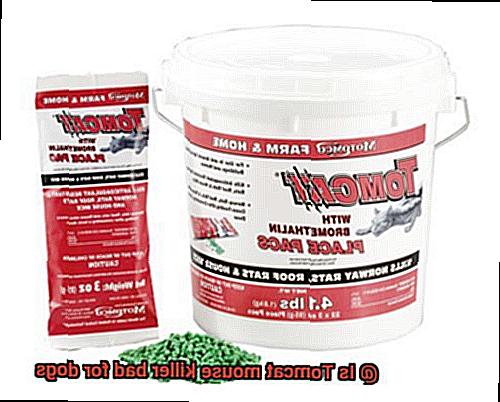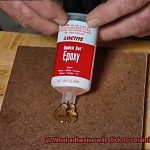We all want a home free from those pesky little invaders called mice. And when it comes to getting rid of them, products like Tomcat mouse killer seem like the perfect solution – promising effectiveness in tackling the problem head-on. But as pet owners who care deeply for our furry best friends, we must pause and ask ourselves: is Tomcat mouse killer truly safe for dogs?
In this blog post, we’ll dive into the potential risks associated with using Tomcat mouse killer around our canine companions. While it may appear harmless at first glance, there are certain factors that demand our attention to ensure our pup’s well-being. Let’s uncover the truth about this common pest control product and shed light on whether it poses any danger to man’s loyal sidekick.
What is Tomcat Mouse Killer?
Contents
- 1 What is Tomcat Mouse Killer?
- 2 How Does Tomcat Mouse Killer Affect Dogs?
- 3 Symptoms of Tomcat Mouse Killer Poisoning in Dogs
- 4 Prevention Tips for Dog Owners
- 5 Alternative Methods for Rodent Control
- 6 Safe Storage and Disposal Practices for Rodenticides
- 7 Veterinary Care for Accidental Poisoning Cases
- 8 Conclusion
Tomcat Mouse Killer is a renowned product that has gained popularity among homeowners and farmers for its exceptional ability to eliminate mice and rats. In this article, we will delve into the details of what exactly Tomcat Mouse Killer is, how it works, and why it has become a go-to solution for rodent control.
Understanding Tomcat Mouse Killer:
Tomcat Mouse Killer is a type of bait that comes in the form of pellets or blocks. It contains a potent toxic ingredient called bromethalin, which is highly effective in targeting rodents. This neurotoxin disrupts the central nervous system of mice and rats, leading to paralysis and eventual death. The bait is strategically formulated to attract rodents, enticing them to consume it.
Why Choose Tomcat Mouse Killer:
- Convenience: Tomcat Mouse Killer offers convenience and ease of use. The pre-packaged bait requires no additional preparation or setup, making it a hassle-free solution for homeowners and farmers.
- Effectiveness: The lethal ingredient in Tomcat Mouse Killer quickly takes effect once ingested by rodents, ensuring a swift and efficient elimination of the pests. The bait’s attractive properties make it an irresistible option for mice and rats, increasing its effectiveness.
- Versatility: Tomcat Mouse Killer can be used in various areas prone to mouse infestations, such as attics, basements, garages, and crawl spaces. Its versatility allows users to target specific problem areas effectively.
Safety Precautions:
While Tomcat Mouse Killer is primarily designed to target rodents, it is essential to take precautions when using this product around pets, especially dogs. Accidental ingestion by dogs can be harmful due to the toxic nature of the active ingredient. To ensure their safety:
- Secure Bait Stations: Place the bait inside locked bait stations that are inaccessible to pets. This prevents dogs from directly accessing the bait.
- Inaccessible Placement: Consider placing the bait in high shelves or behind furniture where dogs cannot reach. This further reduces the chance of accidental exposure.
- Regular Monitoring: Check bait stations regularly for spills or loose pellets and clean them up immediately. Dispose of any unused bait properly to prevent accidental ingestion.
How Does Tomcat Mouse Killer Affect Dogs?
In the eternal battle between man’s best friend and those elusive little rodents, it’s important to be aware of the potential risks that come with using rodenticides like Tomcat Mouse Killer when you have furry friends around. Let’s delve into the research and explore how this popular mouse killer can affect our beloved dogs if ingested.
Understanding the Toxic Ingredients:
Tomcat Mouse Killer contains a potent neurotoxin called bromethalin. This chemical directly attacks the nervous system, causing a range of symptoms in dogs when ingested. It’s worth noting that dogs can be attracted to the smell and taste of this mouse killer, so extra caution is necessary.
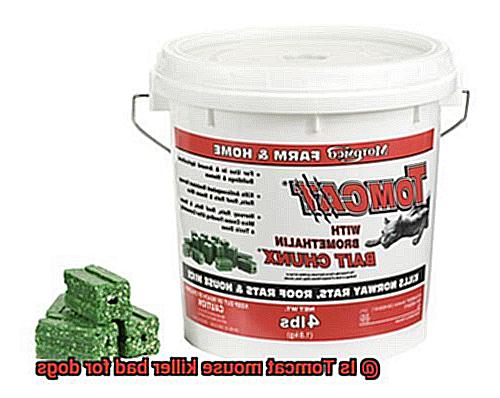
The Telltale Signs:
If your pup gets their paws on Tomcat Mouse Killer, it won’t take long for them to show signs of trouble. Neurological symptoms such as tremors, seizures, and even paralysis may occur. Keep an eye out for gastrointestinal issues like vomiting, diarrhea, and loss of appetite too. These are all red flags that your dog may have ingested something toxic.
Immediate Action is Key:
If you suspect your dog has ingested Tomcat Mouse Killer, time is of the essence. Seek immediate veterinary attention. Your vet may induce vomiting or administer activated charcoal to prevent further absorption of the toxin. Quick action is crucial in these situations.
Treatment and Care:
Treating Tomcat Mouse Killer poisoning in dogs typically involves supportive care. This may include intravenous fluids to flush out the toxin, anti-seizure medications to control seizures, and close monitoring of vital signs. Your vet will design a tailored treatment plan based on your dog’s specific condition.
Prevention is Better than Cure:
To keep your furry friend safe, take preventive measures. Store Tomcat Mouse Killer and other rodenticides securely, out of your dog’s reach. Consider pet-friendly alternatives like trapping, sealing off entry points, or using natural deterrents such as peppermint oil or ultrasonic devices. Remember, prevention is always better than dealing with the aftermath.
Symptoms of Tomcat Mouse Killer Poisoning in Dogs
In the never-ending battle between man’s faithful companion and those elusive little critters, it’s crucial to be aware of the potential dangers lurking when using rodenticides like Tomcat Mouse Killer around our furry friends. Let’s dive into the research and uncover how this popular mouse killer can wreak havoc on our beloved dogs if they happen to get their paws on it.
Understanding the Toxic Ingredients:
Tomcat Mouse Killer contains a powerful neurotoxin called bromethalin, which mercilessly attacks the nervous system, unleashing a range of alarming symptoms in dogs upon ingestion. Dogs can be drawn to the alluring smell and taste of this mouse killer, making extra caution absolutely essential.
The Telltale Signs:
If your precious pup manages to chow down on some Tomcat Mouse Killer, you won’t have to wait long before witnessing signs of trouble. Beware of neurological symptoms such as tremors, seizures, and even paralysis that may rear their ugly heads. Keep a vigilant eye out for gastrointestinal issues like vomiting, diarrhea, and loss of appetite too – these are all glaring red flags that your furry friend may have ingested something toxic.
Immediate Action is Key:
If you suspect that your four-legged pal has ingested Tomcat Mouse Killer, time is absolutely of the essence. Waste no time in seeking immediate veterinary attention. Swift action may involve inducing vomiting or administering activated charcoal to halt further absorption of the toxin. Remember, every second counts in these dire situations.
Treatment and Care:
Treating Tomcat Mouse Killer poisoning in dogs involves providing supportive care tailored to your dog’s specific condition. This may include intravenous fluids to flush out the deadly toxin from their system, anti-seizure medications to control any convulsions that may arise, and close monitoring of vital signs to ensure their well-being throughout the ordeal. Rest assured that your esteemed vet will design a comprehensive treatment plan for your furry companion.
Prevention is Better than Cure:
To keep your furry friend safe and sound, it’s imperative to take preventive measures. Store Tomcat Mouse Killer and other rodenticides securely, far out of your dog’s reach. Consider exploring pet-friendly alternatives like trapping those pesky rodents, sealing off their entry points, or employing natural deterrents such as invigorating peppermint oil or ultrasonic devices. By taking proactive steps, you can prevent a potential disaster and ensure your dog’s health and happiness for years to come.
Prevention Tips for Dog Owners
Tomcat mouse killer is a highly effective rodenticide used to control mice and rats in various settings. While it is an excellent solution for eliminating rodents, it is essential for dog owners to take precautions to ensure the safety of their furry friends. In this article, we will discuss important prevention tips for dog owners when using Tomcat mouse killer.
Store Tomcat mouse killer securely:
The first and most crucial prevention tip is to keep all Tomcat mouse killer products securely stored and out of reach of dogs. Dogs are naturally curious creatures and may be attracted to the smell or taste of the product. To prevent accidental ingestion, store the rodenticide in locked cabinets or high shelves where dogs cannot access them. Even small amounts of Tomcat mouse killer can be harmful to dogs, so taking this precaution is vital.
Monitor your dog’s behavior:
Dogs have an innate curiosity, which may lead them to investigate or consume Tomcat mouse killer if given the opportunity. As a responsible dog owner, it is essential to closely monitor your dog’s behavior, especially if you suspect they have come into contact with the product. Look out for signs such as excessive drooling, vomiting, diarrhea, difficulty breathing, or seizures. If you observe any of these symptoms, seek immediate veterinary care.
Be cautious when using Tomcat mouse killer outdoors:
If you use Tomcat mouse killer outdoors, such as in your garden or yard, it is crucial to be extra cautious to prevent your dog from coming into contact with it. Dogs may accidentally ingest the product while exploring or playing in the area. Consider using alternative methods for rodent control that are safer for pets, such as snap traps or natural deterrents.
Educate yourself about alternative options:
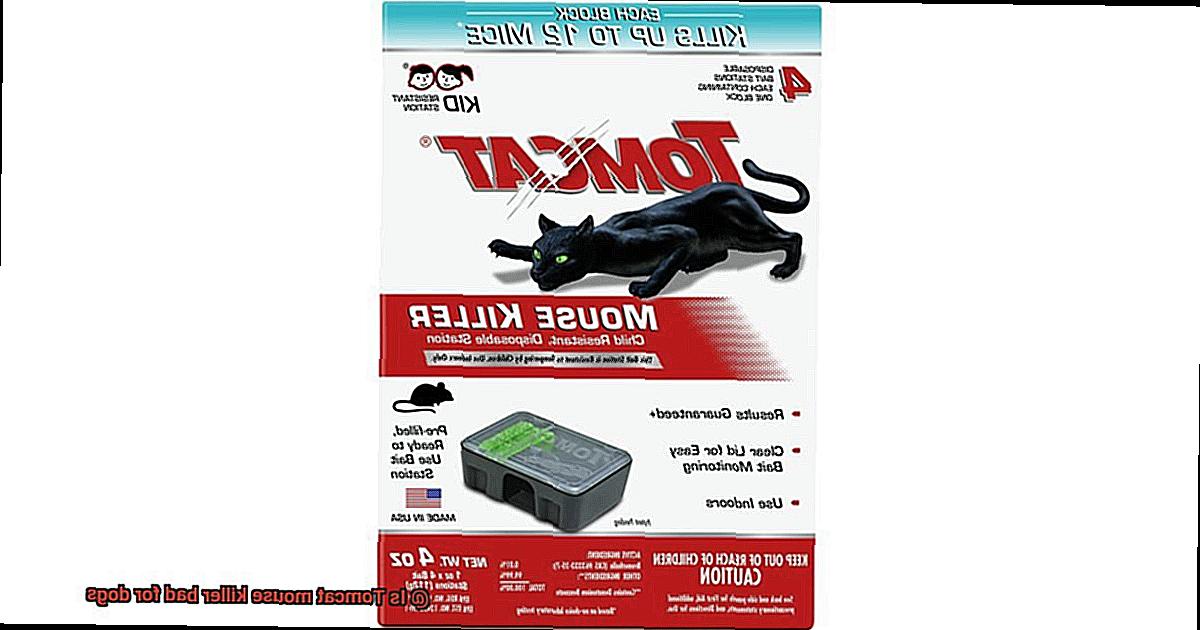
As a dog owner, it is important to educate yourself about alternative options for rodent control that are safe for dogs. There are many pet-friendly alternatives available in the market, such as electronic repellents, ultrasonic devices, or natural repellents like peppermint oil or vinegar. By choosing these alternatives, you can effectively control rodents without putting your dog’s health at risk.
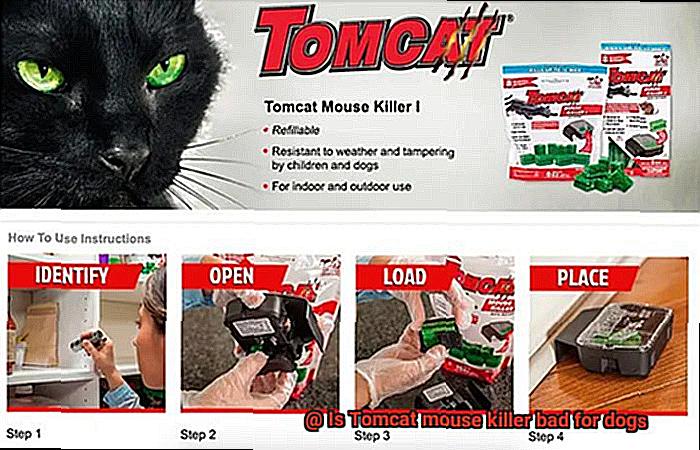
Regularly clean up rodent remains:
If you live in an area where rodents are common, it is essential to promptly clean up any rodent remains. Dogs may be attracted to the smell or taste of dead rodents, which could potentially lead them to consume Tomcat mouse killer if it was used to eliminate the rodents. By regularly cleaning up any rodent remains, you can reduce the risk of your dog coming into contact with harmful substances.
Alternative Methods for Rodent Control
In this comprehensive guide, we will explore a range of alternative methods for rodent control, including natural deterrents, electronic devices, live traps, and the presence of cats. However, it’s important to understand that while these alternative methods offer potential solutions, they may not be as effective in severe infestations.
Natural Deterrents:
Natural deterrents, such as peppermint oil, vinegar, and garlic, have been known to repel rodents. These substances can be applied around entry points to deter mice from entering the house. However, it’s important to note that the effectiveness of natural deterrents may vary depending on the severity of the infestation. Additionally, thorough research is necessary to ensure the safety of pets in the household.
Electronic Devices:
Electronic devices that emit ultrasonic sound waves claim to repel rodents by creating an unpleasant environment for them. These high-frequency sounds are inaudible to humans but irritating to rodents. However, the success of these devices can be inconsistent and may require frequent maintenance.
Live Traps:
Live traps offer a more humane approach to rodent control by allowing for the capture and release of mice without harm. These traps are designed to catch the rodents alive and can be placed strategically around the house. It’s crucial to release the mice far away from your home to prevent re-entry.
Cats as Natural Pest Control:
Cats have long been known for their ability to hunt and kill rodents. The mere presence of a cat can deter mice from entering a property. However, it’s worth noting that not all cats have a strong inclination to hunt pests. Additionally, if you opt for this method, it’s important to consider the safety and well-being of both your cat and the rodents.
Safe Storage and Disposal Practices for Rodenticides
Ensuring safe storage and disposal practices for rodenticides is crucial to protect pets, children, and the environment from potential harm. Rodenticides contain toxic substances that can be harmful if ingested or inhaled, making it important to handle them with caution.
When it comes to storing rodenticides, keep them out of reach of pets by storing them in secure cabinets or containers. A locked cabinet or a high shelf can prevent easy access by curious furry friends. Always keep rodenticides in their original packaging with the label intact. This way, you have all the necessary information about the product, including active ingredients and instructions for safe handling.
Proper disposal of rodenticides is equally important. Never throw them in regular trash or flush them down the toilet. Instead, follow local guidelines for hazardous waste disposal. Contact your local waste management facility for specific instructions on how to dispose of these products safely.
For safe disposal, place the rodenticide in a sealed plastic bag and then put that bag inside another sealed bag. This double-bagging method prevents leakage or accidental exposure during transportation. If possible, take the rodenticide to a designated collection site for hazardous waste in your area.
It’s worth noting that different forms of rodenticides require specific storage and disposal methods. Pellets, blocks, or liquids may have different guidelines, so always refer to the product label for guidance.
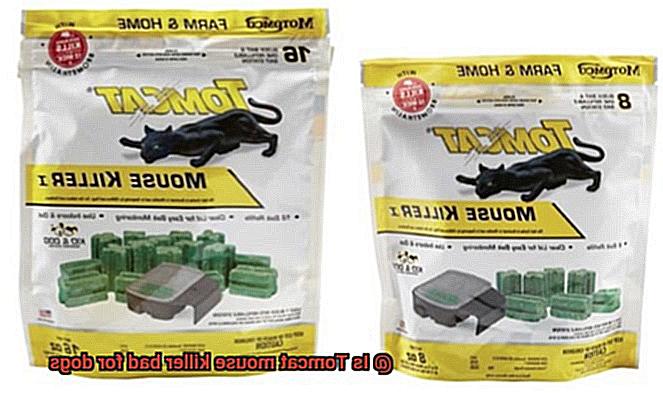
Veterinary Care for Accidental Poisoning Cases
In this article, we will explore the essential veterinary care procedures and guidelines to help you protect your furry friends in case of accidental poisoning.
Seek Immediate Veterinary Care:
The first and most crucial step is to seek immediate veterinary care. Time is of the essence, so don’t delay. Only a professional can accurately assess the severity of the poisoning and provide appropriate treatment.
Inducing Vomiting:
Under the guidance of a veterinarian, inducing vomiting may be necessary to remove any remaining poison from the dog’s stomach. However, please note that this should only be done under professional supervision.
Activated Charcoal Treatment:
Veterinarians may administer activated charcoal to absorb toxins present in the dog’s stomach, preventing them from being absorbed into the bloodstream. This treatment can significantly reduce the impact of the poison.
Supportive Care:
Your veterinarian may provide supportive care to your dog depending on the severity of the poisoning. This could include intravenous fluids to maintain hydration, medications to control symptoms like seizures or vomiting, and monitoring vital signs for any complications.
Transparency is Key:
Be transparent with your veterinarian about the ingested substance. Knowing that Tomcat mouse killer contains bromethalin, a neurotoxin affecting the central nervous system, will help them determine the most appropriate course of treatment.
Diagnostic Tests:
Additional diagnostic tests such as blood work or imaging may be performed to assess organ damage or any other complications resulting from the poisoning.
Preventing Future Accidental Poisonings:
Once immediate veterinary care has been provided, your veterinarian will guide you on preventing future accidental poisonings. This may include securing toxic substances out of reach, using pet-safe alternatives for pest control, and being vigilant about potential hazards in and around the home.
MYWH5lCFmrs” >
Conclusion
In conclusion, it is of utmost importance for dog owners to exercise caution when using Tomcat mouse killer or any other rodenticide in their homes. While Tomcat mouse killer may be a powerful weapon against rodents, it harbors a dangerous neurotoxin called bromethalin that can wreak havoc on our furry friends if consumed.
To keep your canine companion safe and sound, take heed of these preventative measures:
- Lock up Tomcat mouse killer: Safely stow away the product in secure cabinets or high shelves where dogs cannot get their paws on it.
- Stay vigilant: Keep a watchful eye on your dog’s behavior for any signs of exposure or ingestion, such as excessive drooling, vomiting, diarrhea, difficulty breathing, or even seizures.
- Exercise caution outdoors: Shield your dog from contact with Tomcat mouse killer by exploring alternative methods of rodent control in outdoor areas.
- Explore pet-friendly alternatives: Educate yourself about safer options like natural deterrents, electronic devices, live traps, or even enlisting the help of feline friends as natural pest controllers.
- Clean up promptly: Dispose of any rodent remains promptly to prevent your dog from gobbling up toxic substances.
Remember that swift action is crucial if you suspect your dog has ingested Tomcat mouse killer. Waste no time in seeking veterinary attention and diligently follow their guidance on treatment and care.
Prevention always triumphs over cure when it comes to safeguarding our beloved pets.

